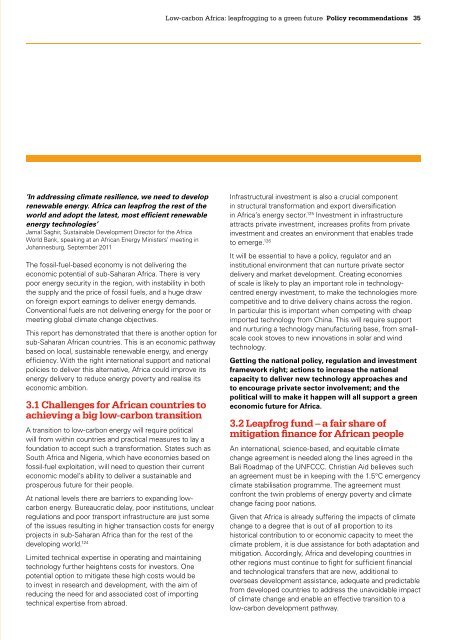Ju8uG
Ju8uG
Ju8uG
You also want an ePaper? Increase the reach of your titles
YUMPU automatically turns print PDFs into web optimized ePapers that Google loves.
Low-carbon Africa: leapfrogging to a green future Policy recommendations<br />
35<br />
‘In addressing climate resilience, we need to develop<br />
renewable energy. Africa can leapfrog the rest of the<br />
world and adopt the latest, most efficient renewable<br />
energy technologies’<br />
Jamal Saghir, Sustainable Development Director for the Africa<br />
World Bank, speaking at an African Energy Ministers’ meeting in<br />
Johannesburg, September 2011<br />
The fossil-fuel-based economy is not delivering the<br />
economic potential of sub-Saharan Africa. There is very<br />
poor energy security in the region, with instability in both<br />
the supply and the price of fossil fuels, and a huge draw<br />
on foreign export earnings to deliver energy demands.<br />
Conventional fuels are not delivering energy for the poor or<br />
meeting global climate change objectives.<br />
This report has demonstrated that there is another option for<br />
sub-Saharan African countries. This is an economic pathway<br />
based on local, sustainable renewable energy, and energy<br />
efficiency. With the right international support and national<br />
policies to deliver this alternative, Africa could improve its<br />
energy delivery to reduce energy poverty and realise its<br />
economic ambition.<br />
3.1 Challenges for African countries to<br />
achieving a big low-carbon transition<br />
A transition to low-carbon energy will require political<br />
will from within countries and practical measures to lay a<br />
foundation to accept such a transformation. States such as<br />
South Africa and Nigeria, which have economies based on<br />
fossil-fuel exploitation, will need to question their current<br />
economic model’s ability to deliver a sustainable and<br />
prosperous future for their people.<br />
At national levels there are barriers to expanding lowcarbon<br />
energy. Bureaucratic delay, poor institutions, unclear<br />
regulations and poor transport infrastructure are just some<br />
of the issues resulting in higher transaction costs for energy<br />
projects in sub-Saharan Africa than for the rest of the<br />
developing world. 124<br />
Limited technical expertise in operating and maintaining<br />
technology further heightens costs for investors. One<br />
potential option to mitigate these high costs would be<br />
to invest in research and development, with the aim of<br />
reducing the need for and associated cost of importing<br />
technical expertise from abroad.<br />
Infrastructural investment is also a crucial component<br />
in structural transformation and export diversification<br />
in Africa’s energy sector. 125 Investment in infrastructure<br />
attracts private investment, increases profits from private<br />
investment and creates an environment that enables trade<br />
to emerge. 126<br />
It will be essential to have a policy, regulator and an<br />
institutional environment that can nurture private sector<br />
delivery and market development. Creating economies<br />
of scale is likely to play an important role in technologycentred<br />
energy investment, to make the technologies more<br />
competitive and to drive delivery chains across the region.<br />
In particular this is important when competing with cheap<br />
imported technology from China. This will require support<br />
and nurturing a technology manufacturing base, from smallscale<br />
cook stoves to new innovations in solar and wind<br />
technology.<br />
Getting the national policy, regulation and investment<br />
framework right; actions to increase the national<br />
capacity to deliver new technology approaches and<br />
to encourage private sector involvement; and the<br />
political will to make it happen will all support a green<br />
economic future for Africa.<br />
3.2 Leapfrog fund – a fair share of<br />
mitigation finance for African people<br />
An international, science-based, and equitable climate<br />
change agreement is needed along the lines agreed in the<br />
Bali Roadmap of the UNFCCC. Christian Aid believes such<br />
an agreement must be in keeping with the 1.5°C emergency<br />
climate stabilisation programme. The agreement must<br />
confront the twin problems of energy poverty and climate<br />
change facing poor nations.<br />
Given that Africa is already suffering the impacts of climate<br />
change to a degree that is out of all proportion to its<br />
historical contribution to or economic capacity to meet the<br />
climate problem, it is due assistance for both adaptation and<br />
mitigation. Accordingly, Africa and developing countries in<br />
other regions must continue to fight for sufficient financial<br />
and technological transfers that are new, additional to<br />
overseas development assistance, adequate and predictable<br />
from developed countries to address the unavoidable impact<br />
of climate change and enable an effective transition to a<br />
low-carbon development pathway.


